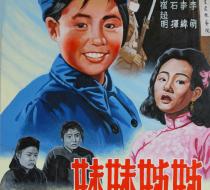"Stand Up, Sisters (《姐姐妹妹站起来》)": The Miserable Past of Chinese Prostitutes Favorite
"Stand Up, Sisters" tells the story of a rural girl who journeys to Beijing for a family visit, only to be deceived and forced into prostitution, suffering unthinkable hardships. After the founding of the People's Republic of China, these women are rehabilitated. The narrative reaches its peak with her and her younger sisters' victorious achievement of self-reliance.
In the spring of 1950, Beijing's brothels were shut down. Prostitutes were assembled for reeducation to begin a new life. Hearing this news, Xihe Chen, a scriptwriter and director at Wenhua, hurried to Beijing. He sought to gather information and comprehend the learning and reform process within these shelters. After returning to Shanghai, he wrote the script "Stand Up, Sisters."
Many modern audiences have seen films and TV shows featuring prostitutes. Lingyu Ruan's moving portrayal of a secret prostitute with immense maternal love in "The Goddess" has touched countless viewers. The courtesans in "The Flowers of War", each unique, break from the traditional submissive image to become patriotic role models of integrity.
Throughout history, both in China and internationally, only a handful of characters from literature like Chen Yuanyuan, Dong Xiaowan, Liu Rushi, and Boule de Suif have gained recognition. Most prostitutes are women grappling with life at society's fringes. The movie "Stand Up, Sisters" provides a direct, realistic, and unbiased portrayal of the lives of these women in the old days.
Li Wei, known for his role as Zhang Zhichen in "Spring in a Small Town", now portrays Shang Youlin, the boyfriend of the female lead. His image as a revolutionary youth remains consistent from "Springtime in a Small Town" through to "My Lifetime" and "Stand Up, Sisters". Cui Chaoming, previously seen as servant Lao Huang in "Springtime in a Small Town", takes on the role of "Rouge Tiger"'s husband, who conspires to force innocent women into prostitution. Li Lingyun plays an old procuress who had been a prostitute herself. It is said this reversal of character led to several breakdowns during her performances, as it reminded her of her past experiences.
"Drama Emperor" Shi Hui brought the villain Gui Jianchou to life. When Daxiang's boyfriend arrived at the brothel in search of someone, he was met by Gui, dressed in a black silk gown and trousers. Before taking action, Gui dramatically shook out his sleeves with a "swish", their length of over a foot billowing like pythons. This venomous display greatly startled the audience.
Following the establishment of the People's Republic of China, Wenhua Film Company often used contrast techniques in their narratives to emphasize one theme: The old society transformed people into ghosts, while the new society restored these ghosts back into humans.
The movie follows a two-stage narrative in which an old society morphs a rural woman into a courtesan, and the new society transforms her into part of the people's epidemic prevention team. Wenhua Film Company, previously known for producing "fresh youth" films and promoting "Shanghai-style culture," has not only set this story in the north but also provided clear value judgments. This suggests that Wenhua is consciously aligning with the ideology of the new society.
Interestingly, apart from a few shots of Beijing's landmark buildings, "Stand Up, Sisters" was entirely shot in a Shanghai studio. Yet, the film didn't lack "Beijing flavor." This was evident in Shi Hui's authentic Beijing accent and industry-specific phrases peppered throughout the dialogues, like "How many bolts of cloth have you sold?" " Are you laying bricks?" and " Alright, let's 'black it out'."
Xihe Chen, a former university professor, only directed one film for the Wenhua Studio. Wenhua is like an "auteur film" group where each director showcases their unique style. Directors like Zuo Lin, Sang Hu, Fei Mu, Shi Hui, and Xihe Chen are all considered independent cultural personalities or "authors". Italian director Santis, who previously filmed "Rome 11:00", expressed great admiration for the “neorealism” technique used in this movie.








